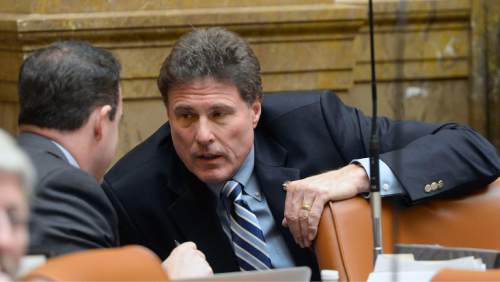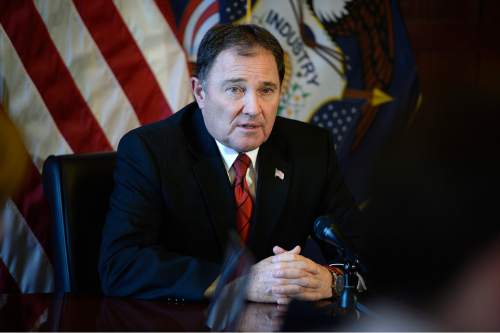This is an archived article that was published on sltrib.com in 2015, and information in the article may be outdated. It is provided only for personal research purposes and may not be reprinted.
Republican leaders have agreed to a broad, conceptual framework for expanding Medicaid to insure tens of thousands of low-income Utahns with a plan that would call on medical providers to pay for the new health coverage.
The so-called Gang of Six — Gov. Gary Herbert, Lt. Gov. Spencer Cox, Senate President Wayne Niederhauser, House Speaker Greg Hughes, House Majority Leader Jim Dunnigan and Sen. Brian Shiozawa — huddled this week constructing the skeleton of a new Medicaid plan to replace the governor's Healthy Utah and the House's Utah Cares proposals.
On Friday, they announced their agreement, saying it was sustainable and would protect other key areas of the budget.
"There is still work to be done," Herbert said in a statement, "but I believe we now have a framework in place that will provide care for Utahns most in need while being responsible with limited taxpayer funds."
Hughes, R-Draper, said the deal is in the best interest of all Utahns.
"If we can provide health coverage for those most in need while protecting other critical areas of our state budget, like public education," he said, "I believe we will have a model for other states to follow."
Sources familiar with the conceptual agreement say it would require hospitals, doctors and pharmaceutical companies to help pay for the expanded coverage, possibly through a new tax. That money then would cover those Utahns living above the poverty level and unable to qualify for traditional Medicaid.
The new tax dollars — or money alternately saved through reducing existing Medicaid reimbursements — would be used as the state's contribution to draw down nearly a billion dollars in federal money. After covering all of the cost the first year, federal reimbursement will be phased down, eventually covering 90 percent of the program.
The state then would tap the Medicaid funds to provide subsidized private health care coverage to as many as 126,500 Utahns who fall into what is known as the Medicaid gap.
But the tentative agreement is still preliminary with many moving parts. It would:
• Still require the state to get waivers from the U.S. Department of Health and Human Services to implement the program.
• Require at last some measure of buy-in from hospitals, doctors and pharmaceutical companies.
• Need to win the approval of the Legislature, particularly the House, which last session resoundingly defeated Herbert's similar Healthy Utah plan.
If the new proposal is ultimately accepted, Utah would be the first state with a Republican-led Legislature and a GOP governor to expand Medicaid through a market-driven system.
"This agreement holds out hope that Utah's compassion can harmonize with her common sense," said Niederhauser, R-Sandy, "and be fiscally sustainable over the long term."
At a recent forum, Hughes suggested that, if hospitals are going to reap the windfall from the newly covered population, then maybe they should step up and pay the state's share. The House speaker went so far as to suggest maybe the state could stay out of the transaction entirely and the federal government could pay the providers directly.
Cox also liked the idea, but said at the time there were some technicalities to be worked through.
RyLee Curtis, an analyst with the Utah Health Policy Project, said she is pleased to see progress being made.
"As long as the community pulls together to provide the benefit to the people of Utah, that's what we'd like to see," she said. "So if that means everyone chipping in to pay for the 10 percent of the cost down the road, if that's what is needed to make an agreement, then that's what we want to see."
Hospitals provide about $50 million in uncompensated care to individuals who would be covered under an expanded Medicaid program, meaning they no longer would have to eat those costs.
During the past legislative session, the Utah Hospital Association said it was willing to pay up to $25 million of the estimated $78 million it would cost the state to fully expand coverage to 138 percent of the poverty level.
But the hospitals wanted doctors and the pharmaceutical industry to pay part of the tab as well. Those groups were unwilling to pick up the cost — either through increased licensing fees for doctors or changes to Medicaid drug-purchasing lists.
The Utah Hospital Association had supported Herbert's Healthy Utah plan, particularly University of Utah Health Care, which provides large amounts of uncompensated care. Selling the plan to the Utah Medical Association and the pharmaceutical interest may be tougher to do.
Representatives of the hospital association and the medical association did not return phone calls Friday afternoon.
Twitter: @RobertGehrke





